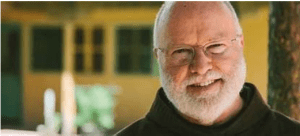It’s oddly wonderful to celebrate the words of college football commentator Kirk Herbstreit and Catholic writer and theologian Richard Rohr in the same blog post. But these are not normal times.
On Sunday night, I came across Herbstreit’s stirring soliloquy about race on “College GameDay.”
“If you’re a white player in these locker rooms, I think it’s really incumbent upon you to really help with the change,” Herbstreit said. “I think it’s one thing to have rallies. It’s one thing to skip a practice because of social injustice. It’s one thing for the NBA and the NFL to miss games to make a statement. Those things are great. But my question is what’s next? What does that lead to? You go back to practice the next day. What will lead to change?”
A few seconds later, Herbstreit was overcome and could barely choke out his words:
“… The black community is hurting. … How do you listen to these stories and not feel pain and not want to help? You know what I mean? It’s like wearing a hoodie and putting your hands at ten and two. ‘Oh God, I better look out because I’m wearing Nike gear.’ What? What are we talking about? You can’t relate to that if you’re white, but you can listen …Because this is not OK. It’s just not. And we’ve got to do better man. … We just got to do better.”
Just a few hours before, I had read an essay by Rohr, one of our generation’s greatest thinkers and spiritual teachers. He was clearly referring to racial reconciliation, and how it might be achieved.
“Mere counting and ledger-keeping are not the way of the Gospel. Our best self wants to restore relationships and not just blame or punish. This is the “economy of grace” and an operative idea of restorative justice,” Rohr wrote.

“After being wronged, few human beings can move ahead with dignity without a full and honest exposure of the truth, as well as accountability. You cannot heal what you do not acknowledge. (Emphasis mine.) Hurt does not just go away on its own; it needs to be spoken and heard. Only then is there a possibility of ‘restorative justice,’ which is what the prophets invariably promise to the people of Israel and Jesus illustrates in the story of the Prodigal Son and throughout his healing ministry.”
It was 20 years ago, while researching my book on the Tulsa race massacre that I first learned the horrible truth of our racial past. It changed my heart, changed my life and gave me a much deeper understanding of the reckoning and awakening that is happening today. It also inspired my theory that there are millions of other white Americans like me, people of good will, who would understand this moment and become committed advocates for change if they only knew the truth of our history.
In his beautiful outpouring, Herbstreit quoted David Shaw, the African American head football coach as Stanford, who share a quote widely attributed to Benjamin Franklin.
“Justice will not be served until those who are unaffected are as outraged as those who are.”
Facing up to our past, learning about it, will not be easy for white Americans. But I can testify to the fact that the effort is redemptive in so many ways. In any event, the alternative is far worse.
———-
To purchase Tim’s book, “The Burning: The Tulsa Race Massacre of 1921,” click here.

